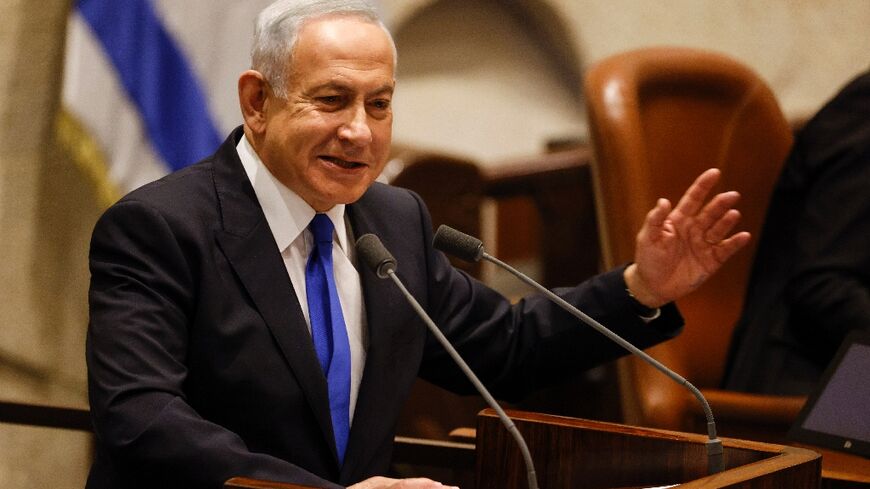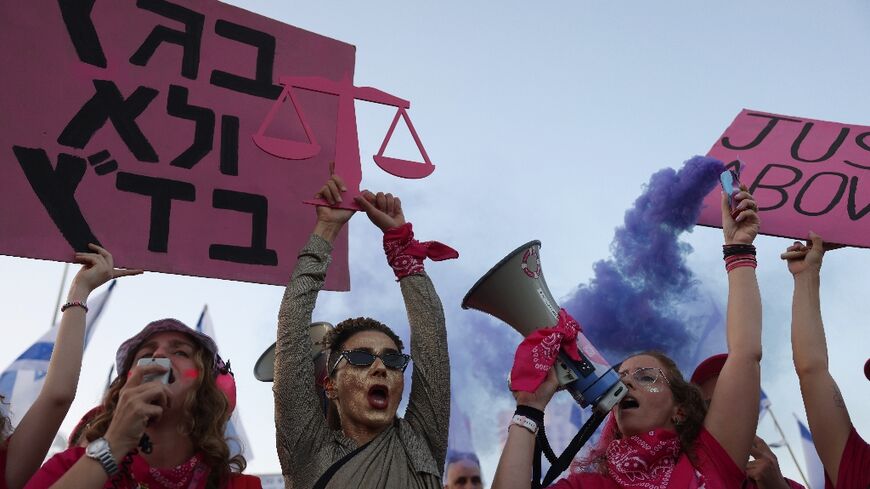Key issues in crisis talks on Israel's divisive judicial reforms

More than three months of tensions culminating in a general strike prompted Israeli Prime Minister Benjamin Netanyahu to pause controversial judicial reforms that had been a signature policy of his hard-right coalition.
Talks began on Tuesday between coalition and opposition representatives under the auspices of President Isaac Herzog, with experts sceptical they might bring a resolution acceptable to both sides.
Here are some of the key issues that have emerged.
- 'Thug militia' -
The last member of government refusing to pause legal reform legislation was extreme-right National Security Minister Itamar Ben-Gvir, who implied he would bolt the coalition but finally agreed to stay on.
His price was a commitment by Netanyahu to have the government approve the formation of a national guard, that would operate under his ministry.
The idea of a national guard emerged following violence in Israeli cities during a May 2021 conflict with Palestinian militants in Gaza, and by the following June, the force was launched as part of the border police.
The notion of Ben-Gvir controlling an armed force has raised concern, with opposition leader Yair Lapid accusing the minister of seeking "to turn his thug militia into a national guard, that will bring terror and violence everywhere in the country."
Ben-Gvir has been convicted in the past of supporting a terror group.
Police are also said to be unhappy with the notion, issuing a joint statement with Ben-Gvir's office saying the commissioner met with the minister and "agreed that police would present to Ben-Gvir their proposal for the formation of the national guard."
- Time for a constitution? -
In remarks on Monday on his hopes for talks with the government, Lapid raised the need to formulate a constitution.
Israel does not have a constitution, rather a series of so-called Basic Laws that together address some of the fundamental issues facing the state.
"As we approach 75 years of the country, we need to sit together and write the Israeli constitution based on the values of the (1948) Declaration of Independence," he said.
But Gayil Talshir, a political scientist at the Hebrew University in Jerusalem, said that forming a constitution with members of the current government would be a "disaster".
"Israel's Declaration of Independence spoke of a Jewish and democratic state, but the main force of this coalition are pulling toward Jewish and non-democratic," she warned.
"It's dangerous to expect that this will be a great constitutional moment for Israel," she said in a talk with reporters.
- Chance for compromise? -
Talks began at the president's residence on Tuesday evening, but experts were far from convinced the negotiations would do much more than delay the government's reform legislation.
Yohanan Plesner, president of the Israel Democracy Institute think tank, said it was possible that Netanyahu would decide that the legislative process was not worth pursuing.
The Israeli premier could also end up "charging ahead with the same package, after a brief blame game of 'We entered a negotiation and the opposition was not ready for that'."
Talshir said the talks were "bound to fail".
"Netanyahu knows exactly what he wants –- to control the Supreme Court, the president of the court, and there's no way the coalition, which is very loyal to Netanyahu, would accept any other solution," she said.
Talshir noted that Herzog had already put forward a compromise drawn up by academics, but it was flatly rejected by Netanyahu.
- Security risks -
The civil unrest sparked by the government's divisive reforms "harms Israeli security," former Mossad chief and army general Danny Yatom told journalists, pointing to threats from multiple actors, including Palestinian militants, Hezbollah and Iran, he said were closely following the crisis.
The growing security risks could actually "come to his rescue," Talshir said of Netanyahu.
"It may be the case that in a security escalation, Netanyahu might have to form some sort of emergency government with (centrist opposition member and former defence minister Benny) Gantz, and dismiss more extremist ministers."
A government with Gantz would "keep the judicial overhaul at bay" and ensure it's "not activated," she said.
- 'Constitutional crisis'? -
If talks fail and Netanyahu's coalition pushes ahead with unilateral legislation, the laws would doubtless be challenged in petitions to the Supreme Court.
And if the court struck down the laws, Israel could find itself in an unprecedented fix because the judicial reforms give parliament power to override such a move by judges.
"If legislation passes, the Supreme Court would have an appeal and is expected to rule reform unconstitutional. So the next stage is actually a constitutional crisis, which would happen should the legislation pass and the supreme court rule it unconstitutional," Talshir said.





